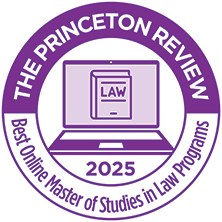

Students are exposed to various legal topics throughout the 31-credit curriculum, influenced mainly by each person’s areas of interest.
In order to ensure comprehension and future course success, all students begin their studies by developing a strong foundation in core legal areas. The first thirteen credits in this masters in law degree build this foundation and cover:
Students may also declare a dual concentration from two of the areas above. For students
who do not wish to concentrate on a single subject, Seton Hall Law offers multiple
courses in a variety of areas, including human resources/employment law, entertainment
law, and technology/cybersecurity, among others. View the full list of online courses, all of which are delivered asynchronously and with maximum flexibility.
The Seton Hall University Catalogue is the definitive source for up-to-date course
offerings and degree requirements.

All courses in the masters in law program deliver material in weekly modules that give students the opportunity to thoroughly explore a specific topic before moving on to the next one. Individual interaction with the professor and group discussions occur weekly. Additional assignments are diverse in objective and scope and are designed to synthesize the content with a practical application. This approach ensures students not only learn the legal concepts, but also how those concepts apply to a workplace setting. Assignments in these courses might include projects such as:
The MLS is designed to help you acquire or develop a unique set of skills that promotes confidence, leadership, critical thinking and problem-solving – all of which are valuable to employers. Skills expand as your studies continue, but you will not have to wait to showcase your ability. Many graduates report that they have been able to apply what they learned in the law masters class to their work environment in real time. The skills they repeatedly acknowledge generally fall into three categories.

Enhanced Communication
Enhanced communication skills begin to develop with the very first course. The legal writing method taught by Seton Hall Law provides a strategy for creating clear and concise written products. The ability to communicate well enables you to influence others and is a sought-after leadership skill.

Legal Analysis
Legal analysis is a key component of the MLS curriculum. Students quickly learn to identify central issues within a specific set of facts, consult relevant law and policy for guidance, and respond with concrete conclusions and recommendations . This analytical framework becomes internalized and makes it easy for you to transfer the skill to any job in any industry.

Critical Thinking
Finally, critical thinking skills are thoroughly developed. Courses in the MLS degree program require students to think critically and creatively, share ideas and opinions, and use knowledge applied to facts to solve problems. People who can work through problems independently or as an effective member of a team are an asset to employers.
If it sounds like the MLS might help you achieve your professional goals, please request more information from us today. We welcome the opportunity to help you discover all the MLS can offer.
Learn about our programs
On Demand
Graduate Program Webinars
For additional information, please contact
[email protected] | 973-642-8747 or 973-761-9000 ext. 8747
